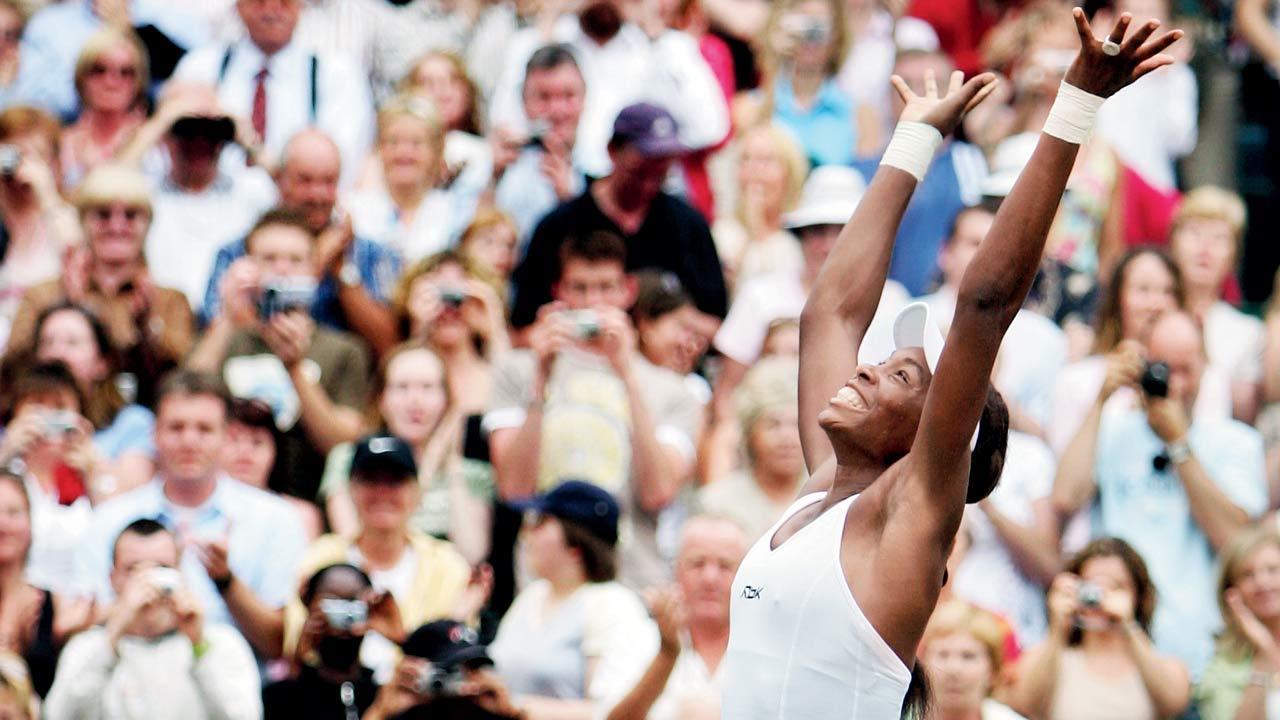In her new book, tennis legend Venus Williams lists down six significant factors that acted as catalysts in her journey towards greatness and defeating the odds both on and off the court

Venus Williams celebrates after winning the Wimbledon women’s singles title in 2005. Pic Courtesy/Getty Images
In 2011, seven-time Grand-Slam champion and tennis legend, Venus Williams was diagnosed with Sjogren’s syndrome, an incurable condition that affects the body’s immune system causing extreme fatigue. This resulted in her withdrawal from most matches that year. However, it did not put an end to her journey. When she attended a wellness retreat, on a suggestion from her sister Serena, she became more self-aware and started making informed lifestyle changes for better recovery.
In her new book, Strive (Hachette India), she shares what she learnt and how she moved forward towards becoming the best version of herself, through a process that was “easy, enjoyable, and exciting”. Here are Venus Williams’ top picks for a better all-round life with simple, practical suggestions.

1 Observe your diet:
Williams took control of her condition when she adopted a vegan diet. She recommends that we observe our nutritional habits and understand what serves us best with our health conditions. Focusing on how one feels after a meal is a good way to identify what needs to be cut-down. For instance, even though Williams loved steak, she realised that she felt heavy after eating it. If something makes you feel sluggish, or disappointed, avoid it. Audit your pantry and fridge from time to time.

2 Balance the number of plates you can carry:
There is a certain pride associated with handling excessive workload. Some days, we might be compelled to take on more than we can chew. In such situations, stepping away from two plates by choosing top priority areas is a helpful trick. Conversely, sometimes, we may be able to do more than we take on, but our “fear of failing” stands in the way. This is where we need to push ourselves and ask ourselves if we’re doing as much as we could to move forward. Having a good night’s sleep is a key factor that supports us to balance our plates, such that we may take smarter decisions and function well.

3 Fix your face:
Williams believes that we “project the outcome” we desire. Posture is indicative of self-assurance. She recalls watching a replay of a match where her body reflected her lack of confidence. Posture includes what we do and our attitude towards others. To project confidence, our posture must correspond to it. This doesn’t mean looking stiff. On the contrary, one must look relaxed and calm. She suggests a few ways to check one’s posture at work.

4 Enrich and inspire:
others: Growth happens where encouragement happens. Enriching the lives of others and inspiring them to grow is a part of realising that our lives are greater than us. It can begin with thanking people for contributing to the community or doing a good job. It can also involve enriching someone’s life by celebrating their victories. Williams urges us not to merely listen but to ask thoughtful questions and dig deeper to celebrate others.

5 Self-soothe:
We encounter plenty of rocky moments in our lives. To deal with them, we must equip ourselves with “the right recovery tools”. Williams lays down a complete chart of food items, including “calming foods” that could help reduce anxiety and release “feel-good” chemicals. In addition to this, she outlines exercises that soothe muscles like our calves, abs, shoulders, hamstrings, etc., which tend to tighten up on a hectic work day.

6 Believe in the power of visualisation:
It can be easy to give up after a failure. The power of visualisation helps us believe we can succeed. Williams asks us to close our eyes and visualise what we wish to achieve, and then visualise ourselves taking the necessary steps towards it. She follows this not only on the court but also before meetings, exercises and meal preparations.
Available At leading bookstores and e-stores
 Subscribe today by clicking the link and stay updated with the latest news!" Click here!
Subscribe today by clicking the link and stay updated with the latest news!" Click here!










